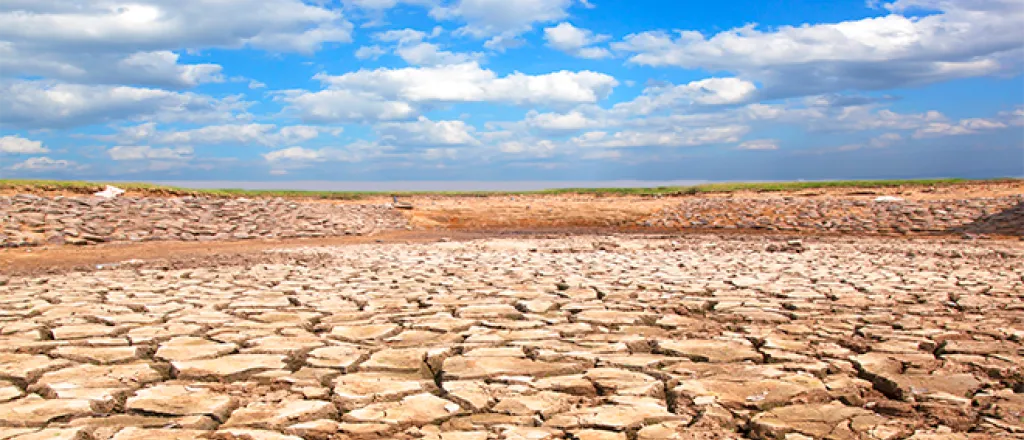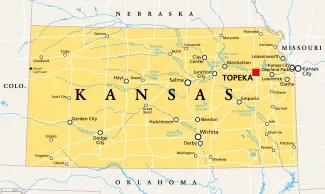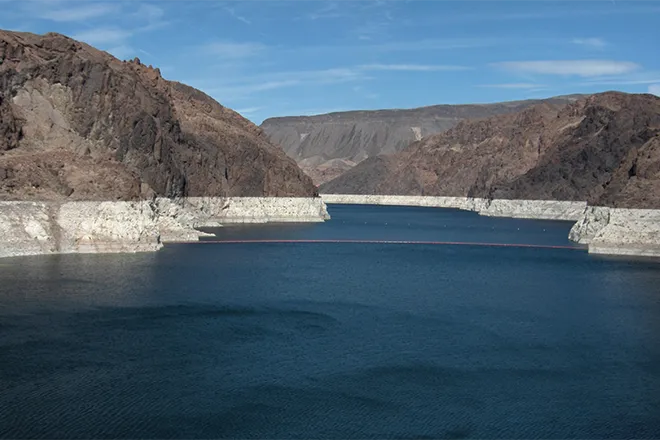
Kansas counties, two cities move water fight to federal court as drought threatens their future
Drought-stricken governments in west-central Kansas have escalated their fight for water rights from state to federal court, which could impact how cities across the state handle future disputes.
The cities of Hays and Russell, located in neighboring counties just off of Interstate 70 near the middle of the state, sued the nearby Edwards County in 2024 for blocking a planned water transfer. The cities do not have enough water to supply future residents. They concocted a plan beginning in 1995 with the purchase of the 7,000-acre R9 Ranch in Edwards County. The ranch contains 32 water rights the cities wanted to use for their public water supply.
The cities say the county has been opposed to the project since before the property was purchased, but county officials have cited concerns over a large amount of water being transferred out of a prominent agricultural community.

© PeterHermesFurian - iStock-1352430281
In district court filings, the cities said Edwards County deliberately thwarted their plans through zoning regulations, a rigged planning committee and other hurdles. After years of fighting, a decision from the district court was delayed, and a case record filled with a 30-year history of newspaper clippings, meeting minutes and government documents turned into a constitutional debate.
Attorneys for Edwards County moved the case to federal court in late March after the cities modified their petition for relief to include claims under federal law. Hays and Russell want it moved back to district court, attorneys said in a May 15 filing. County attorneys want the case thrown out entirely.
“Despite holding this land for thirty-years and a stated desperate and urgent need for additional water supplies, Plaintiffs have only just now brought suit seeking to declare a set of ordinances and regulations enacted by the Board of County Commissioners of Edwards County, Kansas as unconstitutional and unenforceable against Plaintiff,” county attorneys wrote in a February district court filing that was transferred in April to federal court.
The cities evaluated other options for municipal water supply for years before beginning the process in 2014 to transfer the R9 Ranch’s water. They have rooted their case in a 1918 Kansas Supreme Court decision that said “city authorities may go wherever it is practicable and necessary to obtain the supply of water for the people of the city.”
Sending the case back to state court is appropriate, the cities’ attorneys argued, “because Kansas State law claims significantly predominate over federal claims in this proceeding, and judicial economy and fairness support litigating this matter in Kansas State district and appellate courts.”
Plus, they said, the cities have two related cases already navigating their ways through the state court system — one before the Kansas Supreme Court and another before the state Water Transfer Panel, which determines whether certain large-scale water transfers can take place.

© mheim3011 - iStock-544332118
Roughly 10 years ago, officials in Hays and Russell were ready to begin bringing their plan for the R9 Ranch into fruition, so they requested to change the ranch’s water use permissions from irrigation to municipal use. Local irrigators responded in kind, fearing the cities would take up too much of the area’s water reserves. And Edwards County, too, responded with concerns, which the cities saw as blockades. County officials expressed worry over transferring a large amount of water away from their agricultural community.
In 2024, the county established new zoning regulations, which the cities’ lawyers called “unreasonable, arbitrary, capricious, draconian, highly subjective, and blatantly protectionist permitting requirements.”
The cities’ plan isn’t a one-off. As jurisdictions across Kansas and the western U.S. confront dwindling water supplies because of climate change, overconsumption and aging or inadequate infrastructure, litigators and water officials view the case as having the potential to set the stage, depending on the outcome.
Drought outlooks in the three counties range from moderate to abnormally dry, the lowest drought classification, according to a U.S. Drought Monitor map published Thursday. Ellis County, home to Hays, is entirely in the abnormally dry category, while Russell and Edwards counties contain both abnormally dry and moderate drought predictions.
Hays and Russell get their water from the Dakota Aquifer, the Smoky Hill River and Big Creek, which branches off of the Smoky Hill River, according to public water source data from the Kansas Water Office.
Even as the population has fluctuated in Hays, leading to a slight overall increase in residents, daily water usage has decreased. In 2024, the city’s 21,000 residents used an estimated 86 gallons of water per day. In 2010, the city’s 20,500 residents used about 91 gallons per day. At its highest, residents used 101 gallons daily in 2012, and at its lowest, they used 76 gallons daily in 2020 and 2021.
At every Russell City Council meeting, council members hear updated drought predictions, precipitation outlooks and temperature estimates. In January, the city of Russell found that water conditions had improved, which led to Mayor Jim Cross reducing the town’s water watch severity from stage two to stage one. Stage one includes forbidding the waste of water and a prohibition on public and residential outdoor watering during the daytime.
Democratic Gov. Laura Kelly and Republican leadership created a water task force during the 2025 legislative session to shape state water policy and establish a reliable funding source for water conservation efforts.
Hays, Russell and Edwards County are awaiting a decision from a federal judge on where the case continues.

















